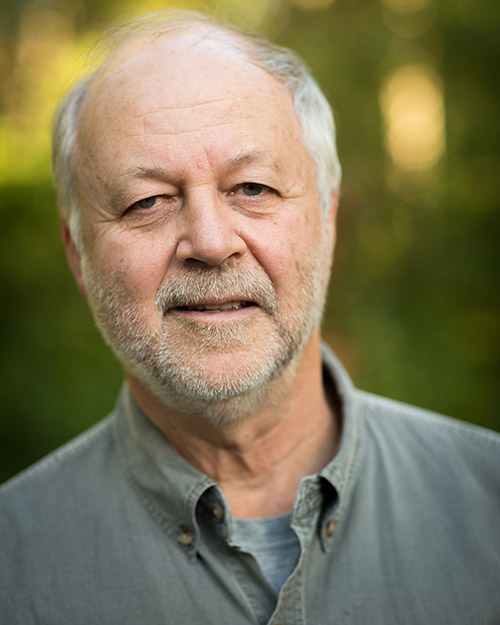George Scarlett is a senior faculty member, faculty advisor for the Master’s Student Association, EP Student Affairs Coordinator and Tisch Faculty Fellow.
With expertise in children’s play, spiritual development, and adolescent’s development as ‘earth stewards’, Professor Scarlett recently published the inaugural edition of a new online magazine: Earth Stewards Tomorrow.
Read on to learn more about Professor Scarlett’s background and the genesis of his new publication.

Nick: What sparked your interest in the topic of children and earth stewardship?
Professor Scarlett: Like most, my interest in earth stewardship came from early experiences of wonder and adventure in the natural world – in my case, in the mountains of New Hampshire where I first experienced awe in the presence of mountains and a paradoxical love for unexpected adversity – electric storms, climbing in the dark, and so forth. There is nothing like being up-close and in constant, intimate contact with the natural world to come to know and respect nature and care for its strength and beauty. In short, I, like most, came to care for the natural world by being out there in the natural world in exciting and very satisfying ways. And because my major vocational/career interest has been in children and their development, it was a match made in heaven for me to take up this topic of children, youth and their development as earth stewards.
Nick: Why do you feel that supporting children’s development as earth stewards is so important?
Professor Scarlett: There are enduring reasons and more recent reasons for supporting children’s and youth’s development as earth stewards. The enduring reasons have to do with the physical, emotional, and spiritual wellness that comes from being in and caring for the natural world; the more recent reasons have to do with climate change and the need for an “All hands on deck” approach that includes preparing children and youth to be the next generation to take on the problems around healing our planet.
Nick: How has connecting children and youth to nature and to becoming earth stewards changed over the years?
Professor Scarlett: Just focusing on changes in our own country, in the latter part of the 19th and early part of the 20th century, the talk was about the nature study movement with its concern for introducing children to the wonders and order in the natural world, an order that reflects the ‘hand’ of the divine. Then, throughout the 20th century, there was a strong emphasis on conserving what had been disappearing under the influence of population growth, industrialization and the widespread use of automobiles and highways that gave access to wilderness. Today, the conversation is more about simply connecting children and youth to nature and fighting the trend of children and youth being disconnected from nature because of suburbanization, worries about stranger danger, social media, playing indoors with technology, and more.
Nick: What are commonly held misconceptions with regards to children and earth stewardship?
One common misconception is that the foundation of earth stewardship is children becoming natural scientists through being taught by adults. The actual foundation is more likely to be children having a great time in nature, experiencing wonder, and having lots of control over what they are doing (building forts, playing games, exploring streams, etc.). Another common misconception is that earth stewardship today means focusing on reducing carbon emissions and recycling when a more productive focus when serving children and youth may well be that of restoring natural systems and biodiversity – that is, a more eco-restoration approach to supporting the development of earth stewards.
Nick: Are there particular headlines coming out of the work done on children’s and youth’s development as earth stewards?
The headlines for the past decade have been about today’s children and youth being disconnected from nature, about the need to foster place-based (local) connections between children and nature, and about the incredible youth climate movement taking place around the world.
Nick: What was the genesis for the publication of “Tomorrow’s Earth Stewards”?
While there are excellent websites and programs that support good ways to connect children, youth and nature, the focus of these websites and programs can be so broad as to lose the focus on stewardship, and virtually all the websites and programs adopt a fairly ethnocentric perspective rather than an international perspective. Furthermore, when discussing climate change, very little is said to foster in children and youth an eco-restoration way of thinking about climate change. The genesis, then, had to do with offering a web magazine that was international in scope with an emphasis on an eco-restoration way of thinking about stewardship.
Nick: What types of content and/or resources are on this new online magazine and what may be unique or special about its mission and offerings?
Tomorrow’s Earth Stewards offers articles on interesting and important programs and methods found in different parts of the world. For example, in the inaugural edition, there are articles on programs in China, Africa, and Scotland – as well as in the U.S.. There are also what we call “ideas” articles that help readers understand better what is meant by an eco-restoration paradigm or approach and what is meant by a developmental perspective or approach. And there are films and ebooks that can be shared with children and youth – as well as reviews of children’s books. Together, the materials provide a special way of thinking about children, youth and earth stewardship, one that is decidedly international, emphasizing eco-restoration, developmental in a particular sense of developmental – all infused with the delights and inspiration coming from an artistic approach to providing visuals and explaining ideas and programs.
Nick: What do you hope the Tomorrow’s Earth Stewards web magazine will contribute to the field and to the movement?
My hope is that the web magazine will contribute not just information but also inspiration for those already involved in supporting children’s and youth’s development as earth stewards – and that it will eventually interest others to do the same. We are today at a crossroads in how we relate to the natural world and our planet. We can remain thinking and doing in the same old ways and suffer severe consequences, or we can change and become the caring partners with nature that we were always intended to be or, at least that we were evolved to be. Survival of the fittest no longer should mean survival of those who can dominate. We are at last coming to the realization that survival of the fittest means survival of those who can cooperate. This is a wonderful message coming from a variety of sources, including the natural sciences. It is also a wonderful message for every child and youth to hear, consider and eventually live by so as to become earth stewards.

 ABOUT
ABOUT